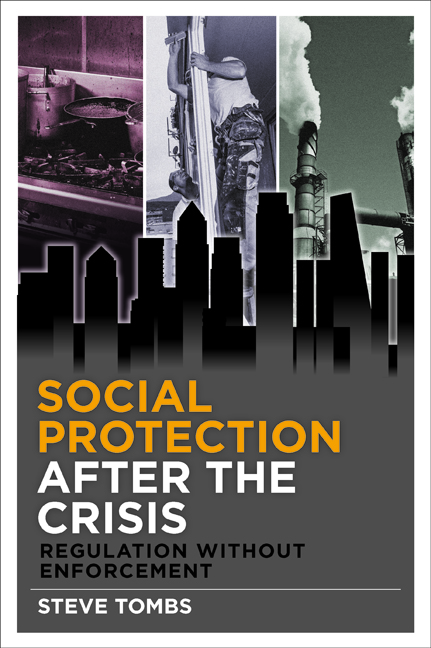Book contents
- Frontmatter
- Contents
- List of tables and figures
- About the author
- Acknowledgements
- one Introduction: some starting points
- two The new material and moral saliences of private capital
- three Framing the crisis: moral critique and the renewal of ‘business as usual’
- four Regulation, orthodoxy and hegemony: crisis, what crisis?
- five Re-regulation in action: ‘Better Regulation’
- six Regulatory inaction? Regulation without enforcement
- seven After regulation?
- Notes
- References
- Index
six - Regulatory inaction? Regulation without enforcement
Published online by Cambridge University Press: 01 September 2022
- Frontmatter
- Contents
- List of tables and figures
- About the author
- Acknowledgements
- one Introduction: some starting points
- two The new material and moral saliences of private capital
- three Framing the crisis: moral critique and the renewal of ‘business as usual’
- four Regulation, orthodoxy and hegemony: crisis, what crisis?
- five Re-regulation in action: ‘Better Regulation’
- six Regulatory inaction? Regulation without enforcement
- seven After regulation?
- Notes
- References
- Index
Summary
‘Increasingly we’re told that our main job is to facilitate business, industry and so on.’ (Environmental Health Officer, interview, Merseyside)
Introduction
The focus of this chapter is on the trajectories of state enforcement of regulatory law in the context of three areas of social protection, spanning national and local regulatory bodies in the UK: food safety, namely the quality and hygiene standards associated with food bought for consumption in the home or otherwise; health and safety at work, the protection of the health, safety and welfare of employees and members of the public from harms associated with work related activities; and pollution control, part of a general environmental protection function, that is, protection of land, air and waterways.
The central claim of the chapter is that various forms of quantitative and qualitative evidence relating to these enforcement activities provide clear and consistent indications that the economic, political and ideological attacks on the idea of regulation have combined to produce regulatory regimes that are based, variously, upon declining levels of enforcement. In this context, it is important to note that the trends set out in this chapter have attracted virtually no critical political nor social comment. Furthermore, even at the end of the period under examination, 2014, it remains the case that political and social references to regulation and enforcement continue to be couched in the same terms, as burdensome, antithetical to economic efficiency and thus prosperity, and so on. That said, the vehemence of these ideological and associated material assaults on regulation and enforcement varies, and plays out distinctly, across regulatory functions and specific regulators, an issue addressed in this and the concluding chapter.
National and local regulators
By way of summary introduction, it should be emphasised that regulation across the three areas of concern here is something of a patchwork of national and local responsibilities. Food Safety enforcement in the UK operates almost entirely at the local authority level, but is overseen by the national body, the Food Standards Agency (FSA). Local functions are divided between EHOs and Trading Standards Officers. Food safety EHOs oversee food safety and food hygiene, enforcing law across all forms of retail food business organisations (restaurant, shops and so on), as well as food processing and food manufacturing outlets.
- Type
- Chapter
- Information
- Social Protection after the CrisisRegulation without Enforcement, pp. 137 - 180Publisher: Bristol University PressPrint publication year: 2015



